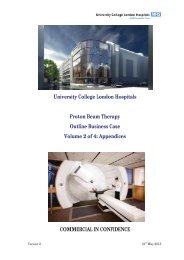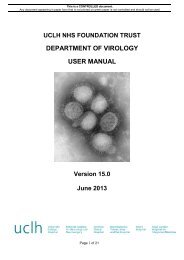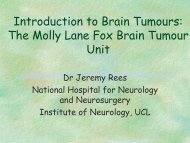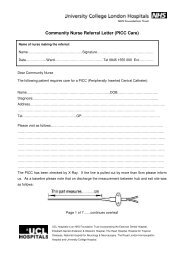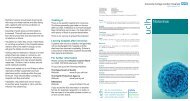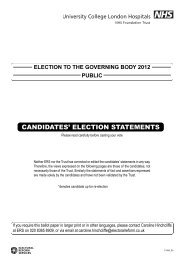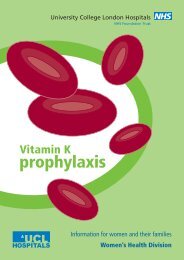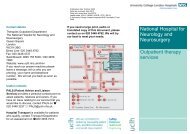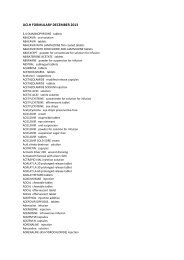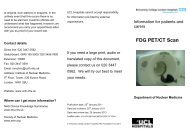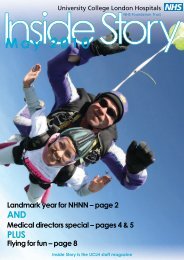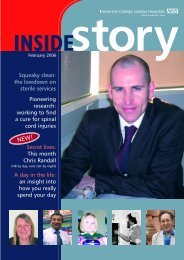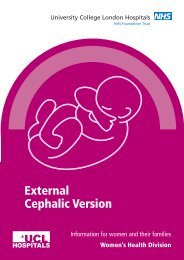Inside Story - April 2013 - University College London Hospitals
Inside Story - April 2013 - University College London Hospitals
Inside Story - April 2013 - University College London Hospitals
You also want an ePaper? Increase the reach of your titles
YUMPU automatically turns print PDFs into web optimized ePapers that Google loves.
2 / UCLH on the box<br />
3 / Twitter talk<br />
8 / Crime fighting surgeon<br />
<strong>April</strong> <strong>2013</strong>
2 News<br />
Keeping Britain Alive<br />
Meet the Team<br />
Produced and<br />
designed by:<br />
The Communications<br />
department<br />
Front cover photo:<br />
Consultant neurosurgeons<br />
Andrew McEvoy and Ludvic<br />
Zrinzo<br />
<strong>Inside</strong> <strong>Story</strong> magazine<br />
is published by UCLH<br />
(<strong>University</strong> <strong>College</strong> <strong>London</strong><br />
<strong>Hospitals</strong> NHS Foundation<br />
Trust) for our staff<br />
Contact us<br />
If you have any information<br />
you would like included in<br />
<strong>Inside</strong> <strong>Story</strong>, or on Insight,<br />
contact: Communications<br />
Unit, 2nd Floor Central,<br />
250 Euston Road, <strong>London</strong><br />
NW1 2PG.<br />
Email: communications@<br />
uclh.nhs.uk,<br />
Tel: ext 79897,<br />
Fax: ext 79401.<br />
Visit us online at:<br />
uclh.nhs.uk<br />
Andrew McEvoy, consultant neurosurgeon<br />
On October 18, 2012 more than 100 camera<br />
crews were dispatched across the UK – their<br />
mission to film every corner of the NHS.<br />
The resulting eight-part-series, Keeping<br />
Britain Alive, captures the grief, heroism, joy,<br />
bitterness, hilarity, frustration, compassion,<br />
tedium and selflessness that are constantly<br />
evident across the NHS.<br />
Five crews assigned to UCLH followed<br />
the life-changing and in some cases, lifesaving,<br />
decisions which our clinicians take<br />
every single day. The series began on March<br />
26. Here is a summary of the UCLH stories:<br />
> > Episode 3 (9 <strong>April</strong>): Emotional scenes<br />
at the National Hospital for Neurology<br />
and Neurosurgery (NHNN) as patient<br />
Daryl Gittens is reunited with his wife<br />
after an eight hour procedure to remove<br />
a brain tumour – while he is awake.<br />
Thanks to consultant neurosurgeon<br />
Andrew McEvoy and his team, Daryl can<br />
look forward to spending precious time<br />
with his wife and children.<br />
Nearby, Patrick Ronayne talks about the<br />
devastating impact of his wife Laura’s<br />
brain haemorrhage, highlighting tireless<br />
teamwork on the neurointensive care<br />
unit, led by Professor Martin Smith.<br />
> > Episode 5 (23 <strong>April</strong>): Back at the<br />
NHNN, Rose Growdon is treated for<br />
violent tremors caused by a condition<br />
known as dystonia. Consultant<br />
neurosurgeon Ludvic Zrinzo and his<br />
team perform deep brain stimulation,<br />
implanting an electrode into Rose’s<br />
brain. Truly stunning!<br />
Meanwhile, newly appointed health<br />
secretary Jeremy Hunt tours the<br />
<strong>University</strong> <strong>College</strong> Hospital Macmillan<br />
Cancer Centre with chief executive Sir<br />
Robert Naylor and chairman Richard<br />
Murley. The secretary of state enjoyed<br />
a full and frank discussion with senior<br />
managers about the challenges facing<br />
the NHS.<br />
> > Episode 6 (30 <strong>April</strong>): It’s a dark<br />
Thursday morning outside the<br />
Whitechapel Mission and the UCLH<br />
mobile TB van is in town to ‘find and<br />
treat’ the homeless. The documentary<br />
captures the work of the unit and its<br />
superintendent radiographer, Jane<br />
Knight; administrator/driver, George<br />
Curley and nurse specialist, Emma<br />
Diggle.
News<br />
3<br />
UCLH aims to<br />
‘Recruit 500’<br />
UCLH has launched a major campaign to<br />
recruit hundreds of new staff nurses and<br />
nursing assistants this year.<br />
A series of open days and special oneday<br />
assessment and interview sessions are<br />
part of the targeted approach focused on<br />
hiring the very best applicants, quickly and<br />
efficiently.<br />
The ‘Recruit 500’ campaign aims to<br />
reduce the vacancy rate from 13 per cent to<br />
eight per cent by September and to five per<br />
cent by this time next year. We are on track<br />
to meet the first target of filling 200 vacant<br />
posts in May.<br />
Chief nurse Katherine Fenton said:<br />
“UCLH needs to fill all of its vacant nursing<br />
posts to meet an increasing demand for our<br />
services. We’re taking a strategic approach<br />
to fill posts with staff who can offer the<br />
absolute best care for our patients, based on<br />
our organisational values which stress the<br />
importance of kindness and teamwork as<br />
well as clinical excellence.”<br />
The campaign has been widely<br />
advertised in a number of trade magazines<br />
and websites including the Nursing Times<br />
and the Royal <strong>College</strong> of Nursing bulletin.<br />
Matthew Chapman, deputy charge nurse and Debbie<br />
Williams, deputy sister<br />
NHS staff pay<br />
The Government has announced that all staff<br />
employed on NHS Agenda for Change and<br />
doctors’ and dentists’ contracts will receive a<br />
‘cost of living’ pay rise this year.<br />
The Government has accepted the Pay<br />
Review Body recommendation that all NHS<br />
staff on AfC terms and conditions receive a<br />
one per cent rise in their basic pay effective<br />
from 1 <strong>April</strong> <strong>2013</strong>. The announcement also<br />
included information about the high cost area<br />
supplement that is paid to staff on Agenda for<br />
Change contracts who work in <strong>London</strong>. This<br />
will also be increased by one per cent – with<br />
the minimum supplement now £4,076 and<br />
maximum £6,279.<br />
The Government has also announced<br />
that it has accepted the recommendations<br />
of the Doctors’ and Dentists’ Review Body<br />
which will also see a one per cent increase<br />
to the salary scales for doctors and dentists<br />
from the same date.<br />
Word on<br />
the Tweet...<br />
Follow us: @uclh<br />
@Casey_41287: WOW!<br />
#KeepingBritainAlive, so<br />
so amazing that they are<br />
literally performing brain<br />
surgery while the mans<br />
awake! #LoveTheNHS<br />
@mokumalef: Nurse-led<br />
rheumatology service at<br />
@uclh is amazing. Skill,<br />
compassion and humanity.<br />
Lets remember MOST<br />
nurses deliver good,<br />
excellent care<br />
@katherine1409: @uclh<br />
massive thankyou to all the<br />
staff in the radiotherapy<br />
department who helped me<br />
through my treatment, you<br />
are all AMAZING!!!!<br />
@148Matt: The brain<br />
tumour op with the man<br />
talking was the most<br />
amazing TV I have ever<br />
seen. Huge respect<br />
to all within the Nhs<br />
#keepingbritainalive<br />
@tobyhillman: Last day<br />
working @uclh > has<br />
been a great year – and<br />
my overall impression has<br />
been that it is on its way to<br />
being an effective learning<br />
org<br />
@matiasformica: “Class<br />
A” A&E care Service<br />
@UCLH. When our<br />
questionable NHS works, it<br />
does it so well.<br />
@mercyfoundcork: @uclh<br />
- great work. Amazing care<br />
#KeepingBritainAlive<br />
@cassiocassio: Thanks<br />
to all at @uclh children’s<br />
ward. Baby Alice<br />
discharged, on our way<br />
home.
4 Spotlight on
Spotlight<br />
5<br />
A top team<br />
leader<br />
They are hidden away from the limelight: prestige, power and<br />
glory is not part of the job description. But for many patients they<br />
are the voice of the NHS. Elke Tullett finds out what makes one<br />
of our medical secretaries so special.<br />
“I think we are the backbone of the Trust,”<br />
says Innica Halsey, who manages a team of<br />
medical secretaries in the medical specialties<br />
division. “We may not make life-changing<br />
decisions but we are an integral cog in the<br />
wheel and a massive link between doctors,<br />
departments and patients.”<br />
If you are elderly or unwell, a friendly,<br />
concerned voice is just what you crave. ‘Dr<br />
Shipley’s PA Innica is always very helpful,’<br />
wrote one patient in a letter to UCLH chief<br />
executive Sir Robert Naylor.<br />
Innica says: “They know a member of<br />
my team is always at the end of the phone,<br />
there’s not just a recorded message and<br />
option buttons to press. I hope that clinicians<br />
find us a source of knowledge too – if a<br />
clinician needs information about a patient<br />
we should know where to find it.”<br />
She says the best medical secretaries<br />
are those who are good team players<br />
and deal with issues quickly, politely and<br />
with empathy. “The best ones also take<br />
ownership of an enquiry or call and deal with<br />
it, rather than passing it on.”<br />
Innica joined UCLH 16 years ago with<br />
100 words-per-minute typing skills, an<br />
NVQ in business studies and a stint as a<br />
temporary admin assistant at Chase Farm<br />
Hospital under her belt.<br />
When she typed up her first medical<br />
letter, her knowledge of French, Spanish<br />
Italian and German proved invaluable.<br />
“It was filled with medical terminology,<br />
like a strange language. I was pretty good<br />
at languages at school and I think that’s why<br />
I took to it so quickly. It was just another<br />
one to learn. I loved typing… it’s rhythmic,<br />
relaxing. Rather like ironing!”<br />
The team has faced change and<br />
restructuring over the past six months, like<br />
other clinical and admin staff. Throughout<br />
it all Innica has retained the loyalty of her<br />
team.<br />
‘She works tirelessly’, ‘I’m proud to be<br />
your colleague’, ‘you are an inspiration to<br />
us’ were a few of the comments posted<br />
on Insight following the UCLH Celebrating<br />
Excellence Awards.<br />
Innica was one of the finalists nominated<br />
by Melanie Watts. Melanie, general manager<br />
for the medical specialties division and acting<br />
divisional manager for infection, describes<br />
her as a fantastic role model and team<br />
leader who ensured her colleagues were<br />
listened to: “Although Innica was herself also<br />
part of the changes that her team were going<br />
through, she remained amazingly positive<br />
and supported her team throughout.” Clinical<br />
colleagues also report on her helpful attitude<br />
to both them and patients.<br />
Innica, however, insists she is not<br />
unique. “Many medical secretaries at UCLH<br />
go above and beyond to fix a problem for<br />
the patient, the doctor or the wider team.<br />
Working for the NHS gives you a greater<br />
sense of purpose.”<br />
“Working for the NHS<br />
gives you a greater<br />
sense of purpose.”<br />
Innica (pictued front row, second from left) with her team
6 In the know<br />
60-seconds with...<br />
Robert Peston<br />
BRIGHTLIGHT on<br />
cancer services<br />
Award-winning BBC<br />
journalist Robert Peston was<br />
at the <strong>University</strong> <strong>College</strong><br />
Hospital Macmillan Cancer<br />
Centre to record a feature<br />
about lung cancer research<br />
for The One Show.<br />
What inspired you to<br />
become a journalist?<br />
It was a happy accident. I<br />
didn’t know what I wanted<br />
to do. I tried journalism and<br />
loved it.<br />
How do you cope with<br />
being recognised in the<br />
street?<br />
People are always nice when<br />
they come up to me. They<br />
are only rude when they<br />
email or write.<br />
How do you like your eggs<br />
cooked?<br />
All ways. I love eggs.<br />
What is the last film you<br />
watched?<br />
Argo, Ben Affleck’s<br />
Oscar-winning film of how<br />
Hollywood rescued hostages<br />
from Iran more than 30 years<br />
ago. A lovely old-fashioned<br />
movie<br />
What did your last tweet<br />
say?<br />
Making film on lung cancer<br />
diagnosis, research &<br />
treatment for #bbcOneShow.<br />
As you may know, this is<br />
stuff I have thought about a<br />
good deal.<br />
If you were Mayor for the<br />
day what would do to<br />
improve <strong>London</strong>?<br />
Abolish cars.<br />
UCLH is leading an exciting<br />
new study that will ask<br />
teenagers and young adults<br />
with cancer what they think<br />
about their care.<br />
The nationwide study –<br />
aptly named ‘BRIGHTLIGHT’<br />
by young people themselves<br />
– is open in 81 trusts and<br />
aims to recruit all young<br />
people aged 13-24 years<br />
diagnosed with cancer in<br />
England over the next 12-18<br />
months.<br />
BRIGHTLIGHT will follow<br />
young people for three years<br />
to determine if specialist<br />
teenage and young adult<br />
cancer services, such as<br />
those at UCLH, improve<br />
outcomes.<br />
The UK has pioneered<br />
many aspects of cancer care<br />
for young people thanks<br />
to the work of charities<br />
like Teenage Cancer Trust<br />
and Clic Sargent who work<br />
closely with UCLH.<br />
Professor Jeremy<br />
Whelan, chief investigator<br />
based at UCLH, said:<br />
“Despite leading the way in<br />
cancer care, we don’t yet<br />
know if specialist cancer<br />
care is better for young<br />
people and if it is, why.<br />
BRIGHTLIGHT is the largest<br />
study of young people with<br />
cancer in the world, and the<br />
international community are<br />
watching the UK and waiting<br />
for the results.”<br />
The BRIGHTLIGHT<br />
survey was developed in<br />
conjunction with patients like<br />
Paris Tompkins who was 15<br />
when she was diagnosed<br />
with papillary carcinoma<br />
of the thyroid. She lives in<br />
Leicester and had to travel to<br />
UCLH for her specialist care.<br />
Paris said: “I’ve learnt a<br />
lot about life since having<br />
cancer and see it in a whole<br />
new perspective now. I<br />
find helping with projects<br />
like BRIGHTLIGHT and<br />
volunteering with charities an<br />
incredibly beneficial way of<br />
using my cancer experience<br />
in a positive light.”<br />
In February 2012 Paris<br />
was given the ‘all-clear’. She<br />
was able to return to sixth<br />
Paris Tompkins<br />
form college and her former<br />
way of life.<br />
If you have a patient who<br />
you would like to consider<br />
for BRIGHTLIGHT please<br />
contact Dr Rachel Taylor<br />
(rtaylor13@nhs.net).<br />
For information about<br />
recruitment and study<br />
progression please see the<br />
BRIGHTLIGHT website<br />
www.brightlightstudy.com
In the know<br />
7<br />
Safety on the<br />
horizon<br />
On top of the<br />
world<br />
Explorers from UCLH and UCL have<br />
embarked on a second expedition to Mount<br />
Everest to learn more about how the human<br />
body responds to extreme environments<br />
and to increase understanding of critically ill<br />
patients.<br />
Back in May 2007 clinicians – including<br />
a number from UCLH – and scientists took<br />
part in the largest ever medical research<br />
expedition to altitude. They made the<br />
arduous trek up 18,000ft to Everest base<br />
camp undergoing rigorous tests along<br />
the way. Eight others continued on to the<br />
summit.<br />
Their mission was to investigate hypoxia,<br />
low oxygen levels in healthy volunteers at<br />
altitude, and bring benefits to the bedside<br />
of patients with low levels of oxygen in<br />
intensive care.<br />
Six years on from the initial trek and the<br />
Xtreme Everest team still have questions<br />
they need answered and another expedition<br />
is underway, involving more than 150 healthy<br />
volunteers.<br />
The first Sherpa trek has now arrived<br />
back in Kathmandu having completed their<br />
testing schedule in north-eastern Nepal in<br />
the first leg of Xtreme Everest 2.<br />
During the trip they were tested in the<br />
‘Sherpa capital’ Namche, which has an<br />
altitude of 3,500m, and is home to the UCL<br />
Institute of Sports Exercise and Health<br />
(ISEH) High Altitude Research Group.<br />
Raise your hats<br />
How can surgeons avoid<br />
making catastrophic mistakes –<br />
and what lessons can be learnt<br />
from airline pilots, fire fighters<br />
and Formula 1 racing drivers?<br />
That was the question posed<br />
by UCLH consultant Kevin<br />
Fong in a recent BBC 2 Horizon<br />
programme. How To Avoid<br />
Mistakes In Surgery looked<br />
at how simulation training<br />
at the <strong>University</strong> <strong>College</strong><br />
Hospital Education Centre<br />
is arming clinicians with<br />
the tools they need to<br />
respond in a crisis.<br />
Staff on the Molly Lane Fox Unit at the NHNN donned their hats for research<br />
into brain tumours. Wear a Hat Day is organised by the Brain Tumour<br />
Research charity. Kathy McDougall, specialist physiotherapist; Nazia Ahmad,<br />
specialist occupational therapist and Louisa Gilpin, specialist speech and<br />
language therapist (pictured left to right), all embraced the event in style.<br />
Nazia said: “The reaction from staff and patients was really positive. Most<br />
people smiled at us and asked where our D’Artagnan was! It was a really fun<br />
way to raise the profile of such an important issue.”
8 <strong>Inside</strong> out<br />
Secret lives<br />
He’s been sprayed in the<br />
face with CS gas, stood in a<br />
snow covered field dressed<br />
in shorts and a vest, found<br />
a knife in a suspect’s socks,<br />
handcuffed a dodgy looking<br />
character, filled in reams of<br />
paperwork in black biro (it<br />
has to be black), had his own<br />
fingerprints taken. And sworn<br />
allegiance to the Queen.<br />
It’s been a busy few<br />
months for crime-fighting<br />
urological surgeon Rohan<br />
Nauth-Misir<br />
When he pounds the<br />
pavements of Westminster,<br />
his intensive training will be<br />
really put to the test. “I think<br />
I will be terrified,” admits the<br />
softly spoken 54-year-old.<br />
Two hundred would-be<br />
volunteer special constables<br />
– many decades younger –<br />
signed up to Hendon police<br />
academy. Fifty fell by the<br />
wayside. When they were<br />
lined up and sprayed with<br />
CS gas during training,<br />
many fell to the floor. But<br />
not Rohan, who shows<br />
off his police badge – CW<br />
5114 – with justifiable pride.<br />
“Apparently about ten per<br />
cent of the population are<br />
immune to CS gas – and<br />
luckily I’m one of them!”<br />
When Rohan was<br />
younger he wanted to be a<br />
pilot but he was steered into<br />
medicine. “My father was<br />
a doctor and my mother a<br />
midwife and it was somehow<br />
expected of me. I enjoy it<br />
hugely but after 30 years I<br />
felt I wanted to try something<br />
completely new.”<br />
He underwent rigorous<br />
written tests and security<br />
checks, put in extra training<br />
at the 52 Club (‘the club staff<br />
were very helpful’) to get into<br />
shape for the timed sprints<br />
and practised the crucial<br />
phrase ‘You do not have<br />
to say anything. But it may<br />
harm your defence...’ until he<br />
could rattle it off in a riot.<br />
The emergency resus<br />
sessions were the most<br />
nerve-wracking. “Everyone<br />
was looking at me. It<br />
would have been really<br />
embarrassing if I had failed<br />
that.” But, he didn’t, of<br />
course. So now he has the<br />
full kit – body armour, baton,<br />
CS spray, handcuffs and<br />
caps.<br />
Rohan, who’s been<br />
burgled three times, will have<br />
the same power as regular<br />
police officers and will be on<br />
patrol (unpaid) at weekends.<br />
Rohan – we wish you luck!<br />
Archive<br />
A nursing recruitment advert<br />
for <strong>University</strong> <strong>College</strong><br />
Hospital from the late 1960s.<br />
The prospectus described<br />
nursing as a career and the<br />
qualifications required (five<br />
O-Levels – one of which had<br />
to be English Language).<br />
The accommodation<br />
available for students is<br />
described as ‘separate<br />
bedrooms for students,<br />
the majority of which are<br />
provided with hot and cold<br />
running water and radiators’.



